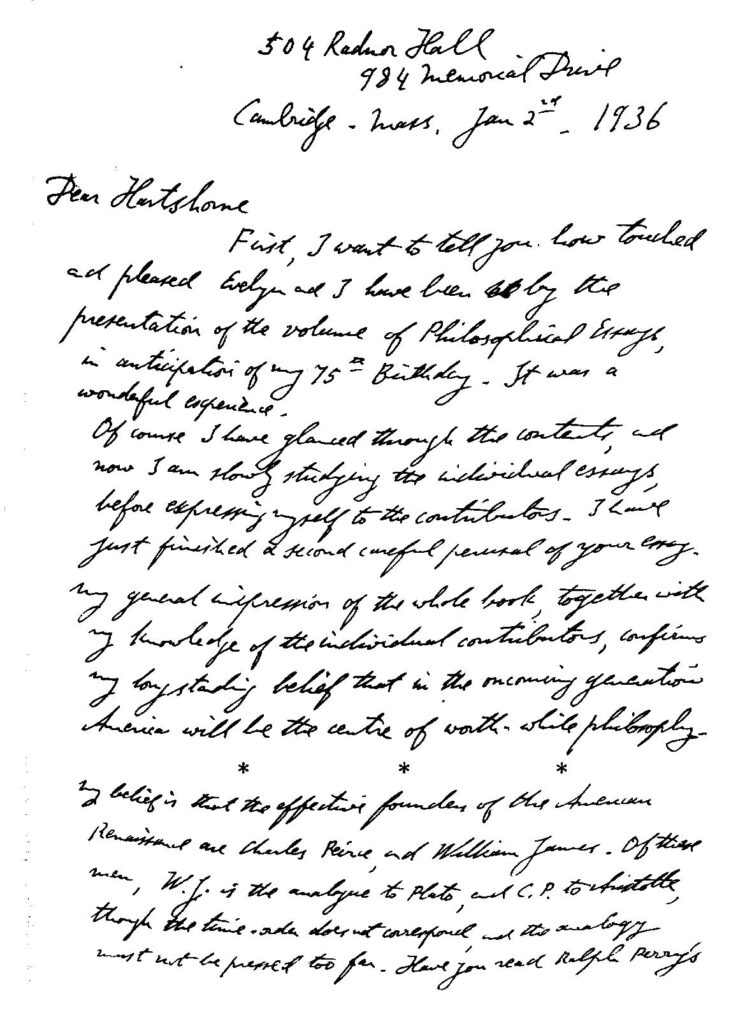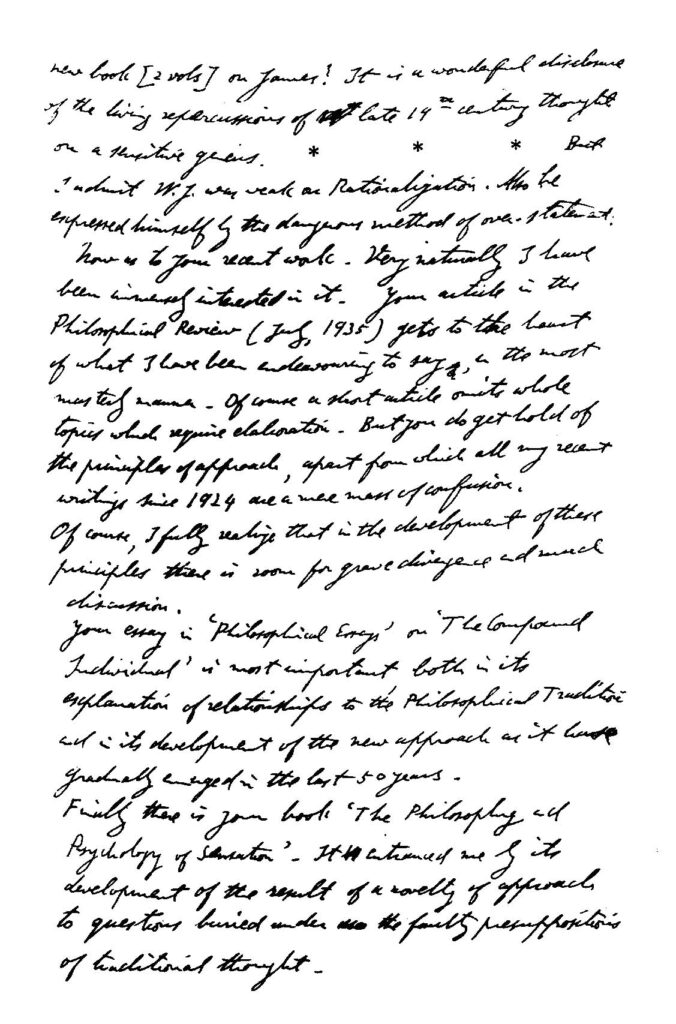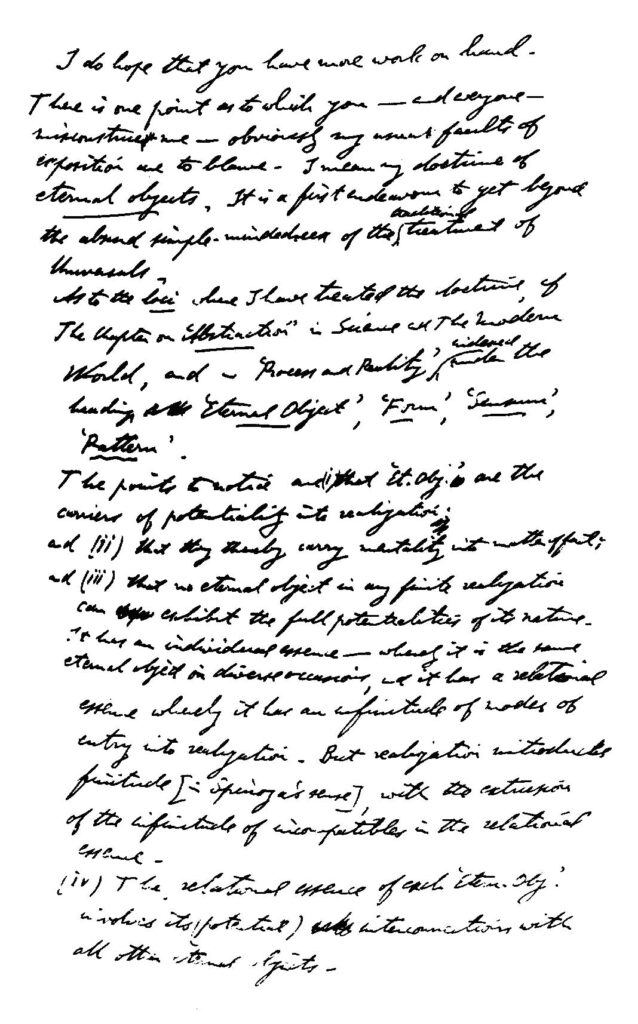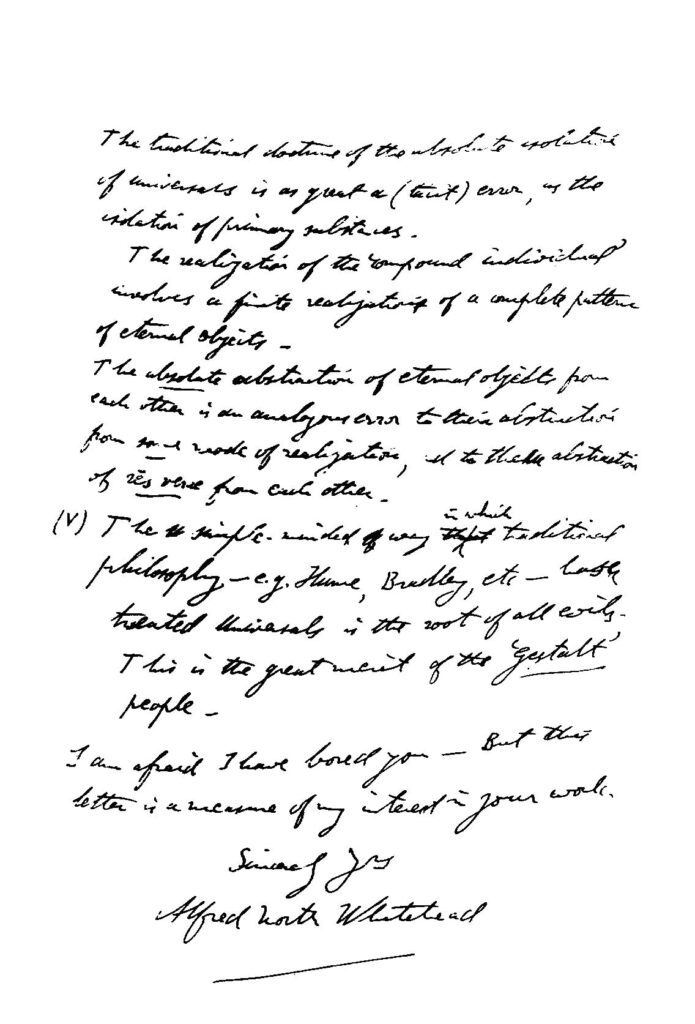Here is a facsimile, in four parts, of a letter from Alfred North Whitehead to Charles Hartshorne written in 1936:




The facsimiles appear as Front Matter in Charles Hartshorne’s book Whitehead’s Philosophy: Selected Essays, 1935-1970.
Here is a transcription of the handwritten letter:
504 Radnor Hall
784 Memorial Drive
Cambridge, Mass.
Jan. 2nd, 1936
Dear Hartshorne
First, I want to tell you how touched and pleased Evelyn and I have been by the presentation of the volume of Philosophical Essays, in anticipation of my 75th Birthday. It was a wonderful experience.
Of course I have glanced through the contents, and now I am slowly studying the individual essays, before expressing myself to the contributors. I have just finished a second careful perusal of your essay.
My general impression of the whole book, together with my knowledge of the individual contributors, confirms my longstanding belief that in the oncoming generation America will be the centre of worthwhile philosophy.* * *
My belief is that the effective founders of the American Renaissance are Charles Peirce and William James. Of these men, W.J. is the analogue to Plato, and C.P. to Aristotle, though the time-order does not correspond, and the analogy must not be pressed too far. Have you read Ralph Perry’s new book (2 vols.) on James? It is a wonderful disclosure of the living repercussions of late 19th century thought on a sensitive genius.* * * But I admit W.J. was weak on Rationalization. Also, he expressed himself by the dangerous method of over-statement.
Now as to your recent work. Very naturally I have been immensely interested in it. Your article in the Philosophical Review (July, 1935) gets to the heart of what I have been endeavouring to say, in the most masterly manner. Of course a short article omits whole topics which require elaboration. But you do get hold of the principles of approach, apart from which all my recent writings since 1924 are a mere mass of confusion. Of course, I fully realize that in the development of these principles there is room for grave divergence and much discussion.
Your essay in ‘Philosophical Essays’ on ‘The Compound Individual’ is most important, both in its explanation of relationships to the Philosophical Tradition and in its development of the new approach as it has gradually emerged in the last 50 years.
Finally there is your book ‘The Philosophy and Psychology of Sensation’. It entranced me by its development of the result of a novelty of approach to questions buried under the faulty presuppositions of traditional thought.
I do hope that you have more work on hand.
There is one point as to which you—and everyone—misconstrue me—obviously my usual faults of exposition are to blame. I mean my doctrine of eternal objects. It is a first endeavor to get beyond the absurd simple-mindedness of the traditional treatment of Universals.
As to the loci where I have treated the doctrine, cf. the chapter on ‘Abstraction’in Science and the Modern World, and in ‘Process and Reality’, indexed under the headings ‘Eternal Object’, ‘Form’, ‘Sensum’, ‘Pattern’.
The points to notice are (i) that ‘Et. Obj.’ are the carriers of potentiality into realization; and (ii) that they thereby carry mentality into matter of fact; and (iii) that no eternal object in any finite realization can exhibit the full potentialities of its nature. It has an individual essence—whereby it is the same eternal object on diverse occasions, and it has a relational essence whereby it has an infinitude of modes of entry into realization. But realization introduces finitude (in Spinoza’s sense), with the extension of the infinitude of incompatibles in the relational essence.
(iv) The relational essence of each ‘Etern. Obj.’ involves its (potential) interconnections with all other eternal objects. The traditional doctrine of the absolute isolation of universals is as great a (tacit) error, as the isolation of primary substances. The realization of the ‘compound individual’ involves a finite realization of a complete pattern of eternal objects. The absolute abstraction of eternal objects from each other is an analogous error to their abstraction from some mode of realization, and to the abstraction of res verae from each other.
(v) The simple-minded way in which traditional philosophy—e.g. Hume, Bradley, etc.—has treated universals is the root of all evils. This is the great merit of the ‘Gestalt’ people.
I am afraid I have bored you—But this letter is a measure of my interest in your work.
Sincerely yrs
Alfred North Whitehead
* * *
The transcribed letter appears on pages 198-199 of Alfred North Whitehead: Essays in His Philosophy, Edited by George L. Kline, with this explanatory note:
“The letter may well be unique as an epistolary clarification of, and commentary on, key points in Whitehead’s philosophy. Except for two brief omissions—indicated by asterisks—the text of the letter is reproduced without change; the abbreviations are Whitehead’s.”
HyC